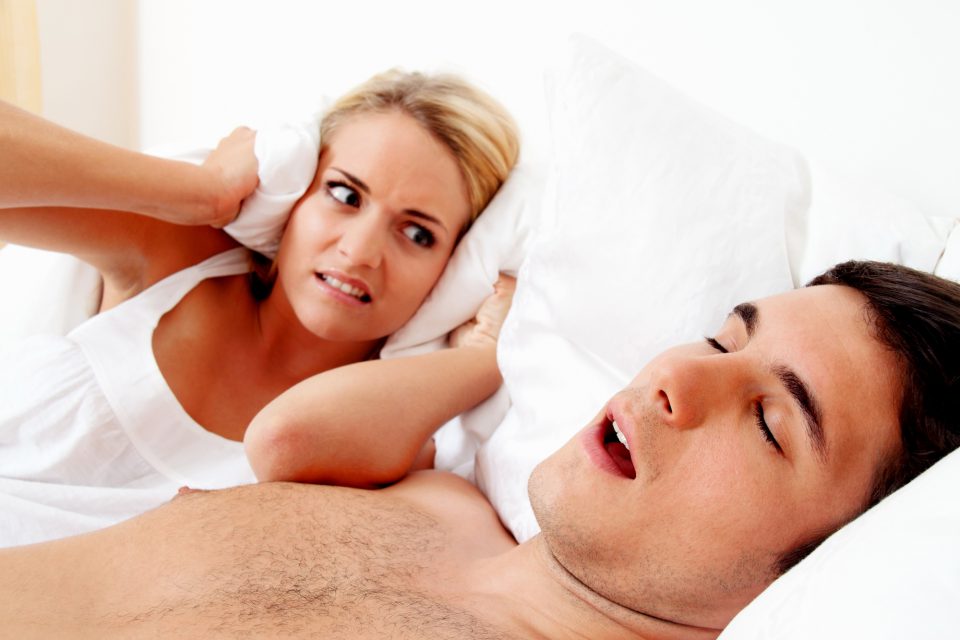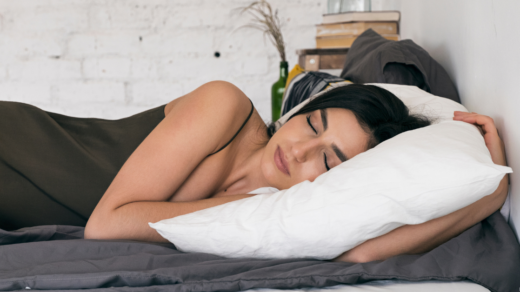November is National Sleep Comfort month, and it’s a good time as ever to reevaluate our sleep patterns as we head into the holiday season. For some people, no matter how many healthy sleep habits they practice, they still experience poor quality sleep and wake up tired. If you’re still having trouble sleeping after implementing near perfect sleep hygiene, it’s likely you have a sleep disorder.
The Link Between Sleep Apnea & Teeth Grinding
About 40 million Americans suffer from chronic sleep disorders each year. One common sleep disorder among almost 31% of the population is teeth grinding, known as bruxism. What many people don’t know is that grinding teeth is often caused by undiagnosed sleep apnea. Sleep apnea is a condition in which the throat muscles obstruct the airways and nasal passageways, causing you to stop breathing for periods of time during the night.

According to the National Sleep Foundation, “nearly one in four people with obstructive sleep apnea grind their teeth at night, and men are more likely to be affected.”
Common Symptoms of Sleep Apnea & Teeth Grinding in Adults
If you’re frequently waking up with headaches, earaches, tired, tight jaw muscles, or sensitive teeth, you are most likely grinding your teeth at night. Bruxism can also show up in worn down teeth and changes in the shape of your teeth.
Sleep apnea, on the other hand, is slightly harder to detect. Some common signs of sleep apnea include:
- Snoring loudly
- Feeling tired even after a full night’s sleep and have excessive daytime sleepiness (hyperinsomnia)
- Trouble staying asleep (insomnia)
- Waking up with a dry mouth, sore throat or headache
- Sometimes waking up gasping or with shortness of breath
- Waking up often to use the bathroom
- Attention, concentration, and memory problems
- Heightened irritability and mood swings

Common Symptoms of Sleep Apnea & Teeth Grinding in Children
Children also experience symptoms of sleep apnea and bruxism. Interestingly, a lot of these symptoms are similar to the symptoms of ADHD, such as difficulty with learning, poor attention span, and poor performance at school. Some other signs to look out for include:
- Snoring
- Excessive daytime sleepiness
- Heavy mouth breathing, both while awake and asleep
- Repeated pauses in breathing during sleep
- Bedwetting
Risks of Continued Sleep Apnea & Teeth Grinding
Left untreated, sleep apnea can lead to other serious health issues including type 2 diabetes, acid reflux, poor immune function, mental health issues, memory loss and increased risk of stroke or heart failure.
Apart from the symptoms of painful and tired jaw, headaches, and sensitive teeth, nighttime teeth grinding can break, loosen, or wear down teeth, enamel, crowns and fillings overtime.
The good news is there are several remedies you can try to help cure sleep apnea and teeth grinding, and in turn improving your sleep quality.
Tips for Eliminating Bruxism & Sleep Apnea for Improved Sleep Quality
A lot of these symptoms can be alleviated through simple lifestyle changes. These include:
- Manage stress levels (bruxism especially is a response to stress and anxiety).
- Lose weight and maintain a healthy weight (obesity increases the likelihood of airway obstruction and narrowed nasal passages).
- Try yoga (improves respiratory strength and oxygen flow).
- Limit alcohol intake. (Alcohol relaxes the throat muscles, which leads to snoring and interrupted sleep cycle, as well as contributes to inflammation of your airways, blocking your breathing).
- Quite smoking. (Tobacco causes inflammation and swelling in your throat).
- Change your sleeping position. (Sleeping on your back relaxes the throat muscles, thus restricting airflow).
- Use a humidifier (especially if you live in a dry climate).
- Improve sleep hygiene:
- Reserve the bedroom for sleep only.
- Keep a consistent sleep schedule, going to sleep and waking up at the same times every day (even on weekends).
- Avoid caffeine after noon.
- Avoid blue light from screens at least one hour before bed.
- Try not eating at least 2-3 hours before bed.
- Keep your room dark and the temperature cool.
- Exercise daily.
- Practice a relaxing bedtime routine.
If these lifestyle changes don’t improve your sleep, some common treatments for bruxism and sleep apnea include medication, surgery, or use of oral appliances to reposition your jaw or tongue to keep your airway open while you sleep. Getting fitted for a custom night dental guard can protect the teeth against grinding and assist with jaw alignment. The American Academy of Dental Sleep Medicine supports custom-fit appliances as “an effective treatment option for snoring and obstructive sleep apnea (OSA)”.

Try implementing these remedies to improve sleep quality, as well as working with your dentist (or pediatric dentist for your children) to discuss your symptoms and find a solution that work best for you.
Find a dentist near you to discuss your options and get started on a path to better sleep.


